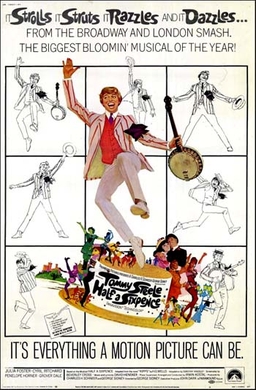
Half a Sixpence (film)
Half a Sixpence is a 1967 British musical film directed by George Sidney starring Tommy Steele, Julia Foster and Cyril Ritchard. It was choreographed by Gillian Lynne. The screenplay by Beverley Cross is adapted from his book for the 1963 stage musical of the same name, which was based on Kipps: The Story of a Simple Soul, the 1905 novel by H. G. Wells. The music and lyrics are by David Heneker.
Half a Sixpence
Charles H. Schneer
George Sidney
executive
John Dark
21 December 1967
143 minutes
United Kingdom
English
$6 million[1]
This was the final film made by Sidney.
Plot[edit]
In Victorian England, a young orphan, Arthur Kipps ("Artie"), finds a sixpence as he walks along a river with his young friend, Ann. Artie is then sent to a nearby town, where he is to serve as apprentice to a draper.
Several years later he meets up with Ann once again, and with the coin cut into two he gives one half to Ann as a symbol of their love.
Artie grows up into a young man. Work at the draper's store is difficult. He becomes friends with Harry Chitterlow, an actor-playwright, who discovers that Artie is heir to a fortune left him by his grandfather. Artie becomes wealthy as a result of the inheritance, and invests in one of Chitterlow's shows. He breaks up with Ann, who has become a maid, and becomes engaged to the wealthy upper class Helen Walsingham. Kipps gets Helen's brother Hubert to invest his money.
Artie sees Ann mistreated by the upper class at a dinner and ends his relationship with Helen. He marries Ann and plans to build a mansion. Ann becomes unhappy with Artie's grandiose ambitions. Hubert absconds with Artie's money leaving him broke.
Artie and Ann reunite and prepare happily to live in a modest cottage. Then Chitterlow reappears with news that his play is a success and that Artie will earn some of the profits.
Development[edit]
The musical was seen by producer Charles H. Schneer who loved it and acquired the rights. He sold these to Paramount. In November 1965, Paramount bought the screen rights for $250,000 plus a percentage of the profits. They also hired Steele to repeat his stage performance.[2]
In June 1966, George Sidney signed to direct.[3] Steele signed a three picture deal with Paramount.[4]
Steele said: "if this hits I'll carry on the burden of starring in musicals in widescreen and in colour. If not I'll retreat to the backwoods and do what I'd as soon do, just quietly act."[5]
Schneer said: "Unfortunately, just as we began to shoot, Paramount was
sold to Gulf & Western. Half a Sixpence should have been a small and intimate picture. It turned out to be anything but that. The director and the star ran away with it, and I was virtually out of the picture. I was very unhappy about the whole situation."[6]
Production[edit]
Filming started 13 September 1966 in England. It was meant to take four months but went over schedule.[7]
Location scenes include Aylesford, Kent; The Pantiles in Royal Tunbridge Wells, Kent;[8] Eastbourne, East Sussex; Blenheim Palace, Oxfordshire; Oakley Court, Berkshire; Devil's Bridge, Ceredigion; and Ockham, Surrey. Interiors were filmed at Shepperton Studios, Surrey.
Sidney later recalled making the film was "quite an experience because they'd never made a musical film in England" for a number of years. "They'd never worked with playback in England, and when I went there they didn't have a music cutter. So I had to bring some people in... It wasn't fast working in England, not by a long shot. But I must say that I enjoyed it."[9]
According to one report, the budget was originally $2.5 million, then increased to $3.3 million.[10]
Julia Foster's vocal double was Marti Webb, who played Ann in the original 1963 London production (and who appears on the London Cast album).
Box office[edit]
The movie was the 13th most popular at the UK box office in 1969.[20] Sidney says the film was "a real smash" in England but "did less than nothing" in the US "because it was an English picture. The film didn't have anyone in it that anyone in this country knew. Unfortunately Tommy Steele had just made two very bad pictures in this country. We followed those and had nothing to build on with him." Sidney also felt the film's financial prospects were hurt by the popularity of Beatlemania. "That brought in a whole new sound," he said. "Maybe if we had been two or three years earlier with the picture, it might have been more successful with American audiences."[9]
Awards and nominations[edit]
The film was nominated for the BAFTA Award for Best Costume Design - Colour.[21]